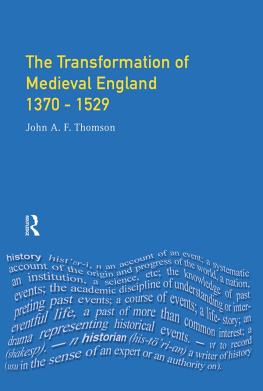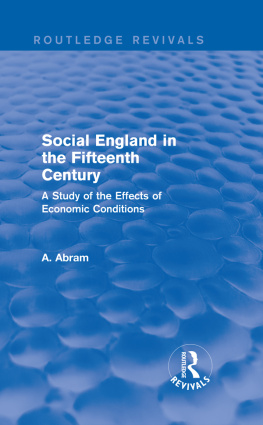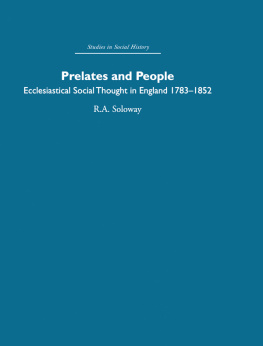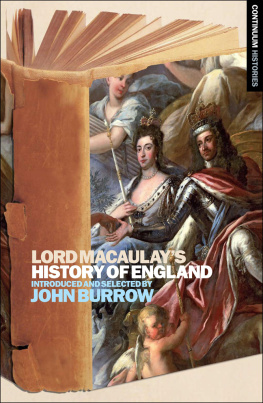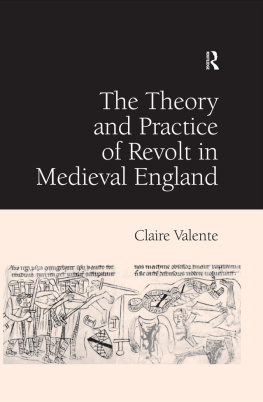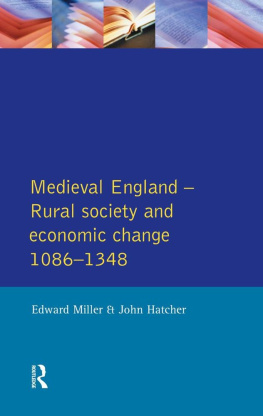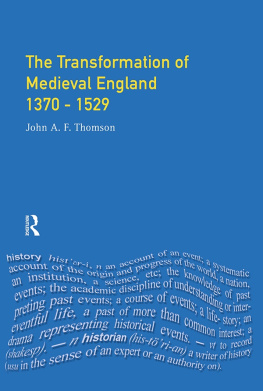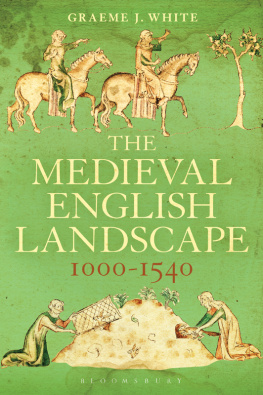THE TRANSFORMATION OF MEDIEVAL ENGLAND
13701529
Foundations of modern Britain
General editor: Geoffrey Holmes
THE TRANSFORMATION OF MEDIEVAL ENGLAND
13701529
John A. F. Thomson
THE EMERGENCE OF A NATION STATE
The commonwealth of England 15291660
Alan G. R. Smith
THE MAKING OF A GREAT POWER
Late Stuart and Early Georgian Britain 16601722
Geoffrey Holmes
THE AGE OF OLIGARCHY
Pre-Industrial Britain 17221783
Geoffrey Holmes and Daniel Szechi
THE FORGING OF THE MODERN STATE
Early industrial Britain 17831870
Eric J. Evans
THE ECLIPSE OF A GREAT POWER
Modern Britain 18701992
Second Edition
Keith Robbins
Foundations of modern Britain
THE TRANSFORMATION OF MEDIEVAL ENGLAND
13701529
John A. F. Thomson

First published 1983 by Pearson Education Limited
Published 2014 by Routledge
2 Park Square, Milton Park, Abingdon, Oxon OX14 4RN
711 Third Avenue, New York, NY 10017, USA
Routledge is an imprint of the Taylor & Francis Group, an informa business
Copyright 1983, Taylor & Francis.
All rights reserved. No part of this book may be reprinted or reproduced or utilised in any form or by any electronic, mechanical, or other means, now known or hereafter invented, including photocopying and recording, or in any information storage or retrieval system, without permission in writing from the publishers.
Notices
Knowledge and best practice in this field are constantly changing. As new research and experience broaden our understanding, changes in research methods, professional practices, or medical treatment may become necessary.
Practitioners and researchers must always rely on their own experience and knowledge in evaluating and using any information, methods, compounds, or experiments described herein. In using such information or methods they should be mindful of their own safety and the safety of others, including parties for whom they have a professional responsibility.
To the fullest extent of the law, neither the Publisher nor the authors, contributors, or editors, assume any liability for any injury and/or damage to persons or property as a matter of products liability, negligence or otherwise, or from any use or operation of any methods, products, instructions, or ideas contained in the material herein.
ISBN 13: 978-0-582-48976-9 (pbk)
British Library Cataloguing in Publication Data
Thomson, John A. F.
The transformation of medieval England
1370 1529 (Foundations of modern Britain)
1. Great Britain History 14th century
2. Great Britain History Tudors, 14851603
I. Title II. Series
942 DA225
Library of Congress Cataloging in Publication Data
Thomson, John A. F.
The transformation of medieval England, 13701529.
(Foundations of modern Britain)
Bibliography: p.
Includes index.
1. Great Britain History Medieval period,
1066 1485. 2. Great Britain History Tudors. 1485 1603.
I. Title II. Series.
DA175.T45 942.04 82 15336
ISBN 0-582-48975-X AACR2
ISBN 0-582-48976-8 (pbk.)
Contents
So prodigious has been the output of specialized work on British history during the past twenty years, and so rich its diversity, that scholars and students thirst continually after fresh syntheses. Even those who read for the pure pleasure of informing themselves about the past have become quite reconciled to the fact that little can now be taken for granted. An absorbing interest in local situations, as a way to understanding more general ones; a concern with those processes of social change which accompany economic, educational and cultural development, and which often condition political activity too: these and many other strong currents of modern historiography have washed away some of our more comfortable orthodoxies. Even when we know what happened, there is endless scope for debate about why things happened and with what consequences.
In such circumstances a new series of general textbooks on British history would not seem to call for elaborate justification. However, the six volumes constituting Foundations of Modern Britain do have a distinct rationale and they embody some novel features. For one thing, they make a serious attempt to present a history of Britain from the point at which Britain became first a recognizable entity and then a great power, and to trace the foundations of this State in the history of pre-eighteenth-century England. The fact that five of the six authors either have taught or are teaching in Scottish universities, while one has held a chair in the University of Wales, should at least help to remind them that one aim of the series is to avoid excessive Anglo-centricity. The first two volumes, spanning the years 13701660, will certainly concentrate primarily on the history of England, emphasizing those developments which first prepared the way for, and later confirmed her emergence as an independent commonwealth, free from Continental trammels whether territorial or ecclesiastical. But the reader should also be aware, as he reads them, of Englands ultimate role as the heart of a wider island kingdom in which men of three nations came to be associated. During the period covered by volumes 3, 4 and 5 16601870, this United Kingdom of Great Britain became not only a domestic reality but the centre of an Empire and the posssessor of world-wide influence. Space will allow only limited treatment of Ireland and of Anglo-Irish relations until after the Union of 1801. It is appropriate, however, that in the final volume of the series reasserted nationalism should figure almost as strongly as the erosion of imperial status in the story of Britains slide down the slippery slope from palmy greatness to anxious mediocrity. The original terminal date of volume 6, 1975, was deliberately chosen: the year in which Britain, tortured once again by her Irish inheritance and facing demands for Scottish devolution, or even independence, belatedly recognized that the days of complacent self-sufficiency as regards Europe, too, were past.
As well as paying more than mere lip-service to its own title, the present series adopts an irreverent attitude to time-honoured chronological divisions. Those lines of demarcation between volumes which dominated virtually every English history series conceived before 1960 (and, with a few exceptions, have displayed a remarkable capacity for survival subsequently) are seen as a quite unnecessary obstacle to readers understanding of the way modern historiography has reshaped whole vistas of our islands history in the past forty years. Years such as 1485, 1603, 1689, 1714, 1760 or 1815 established themselves in textbook lore at a time when they accurately reflected the heavily political and constitutional emphasis of traditional history teaching. Even on those terms they have become of limited utility. But equally seriously, the conventions which such divisions perpetuate often make it extremely difficult for authors to accommodate fundamental aspects of social and economic development within their allotted compass. The brutal slicing off of Tawneys century (15401640) at 1603 is perhaps the worst of these atrocities; but it is not the only one.
All dates are to some extent arbitrary as lines of division, and all present their own difficulties. It is hoped, none the less, that those selected in this series to enclose periods which are in any case a good deal longer than average, may prove less inhibiting and confusing than some of their predecessors and much more adaptable to the needs of British history courses in Universities and colleges.
Next page
